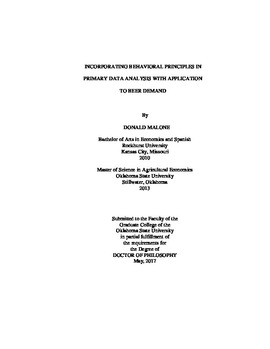| dc.contributor.advisor | Lusk, Jayson L. | |
| dc.contributor.author | Malone, Donald | |
| dc.date.accessioned | 2018-03-13T18:16:01Z | |
| dc.date.available | 2018-03-13T18:16:01Z | |
| dc.date.issued | 2017-05 | |
| dc.identifier.uri | https://hdl.handle.net/11244/54563 | |
| dc.description.abstract | Recent advancements in microeconomics have resurrected a need for modern economists to grapple with principles of consumer behavior. This dissertation uses the American beer market as a starting place to present three ways applied researchers can incorporate behavioral principles into economic theory. The first essay uses choice experiments designed to estimate the price sensitivity of alcohol consumption to explore the efficacy of prompts targeted at reducing inattention bias. Upon receiving feedback, inattentive respondents are given the opportunity to re-answer a so-called "trap question" that checks for attentiveness. We find that individuals who miss trap questions and do not correctly revise their responses have significantly different choice patterns as compared to individuals who correctly answer the trap question. The second essay proposes an instrumental variable approach to address the endogeneity issues associated with distinguishing preferences from perceptions. Even after correction, we find beliefs/perceptions substantially affect consumer choices of beer brands, and that perceived taste and brand familiarity are key determinants of choice. In the final essay, we empirically tests the effectiveness of two institutional nudges on the ECE in a field experiment at a bar. Focusing on craft beer sales, we manipulate the number of options on the menu and use institutional nudges (a control menu, a menu with a special prominently displayed, and a menu with Beer Advocate scores). In the field experiment, the ECE was alive and well using the control menu, but the effect reversed itself when the menu included Beer Advocate Scores. Our results suggest the ECE might be turned on and off by manipulating search costs. Taken together, these three essays show that that behavioral principles can enrich understanding of human action as it relates to consumer decision-making. | |
| dc.format | application/pdf | |
| dc.language | en_US | |
| dc.rights | Copyright is held by the author who has granted the Oklahoma State University Library the non-exclusive right to share this material in its institutional repository. Contact Digital Library Services at lib-dls@okstate.edu or 405-744-9161 for the permission policy on the use, reproduction or distribution of this material. | |
| dc.title | Incorporating behavioral principles in primary data analysis with application to beer demand | |
| dc.contributor.committeeMember | Brorsen, B. Wade | |
| dc.contributor.committeeMember | Norwood, F. Bailey | |
| dc.contributor.committeeMember | Arens, Zachary | |
| osu.filename | Malone_okstate_0664D_15054.pdf | |
| osu.accesstype | Open Access | |
| dc.type.genre | Dissertation | |
| dc.type.material | Text | |
| thesis.degree.discipline | Agricultural Economics | |
| thesis.degree.grantor | Oklahoma State University | |
